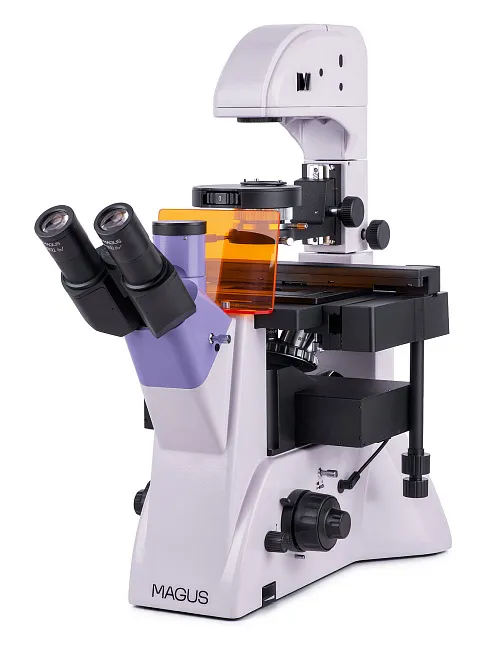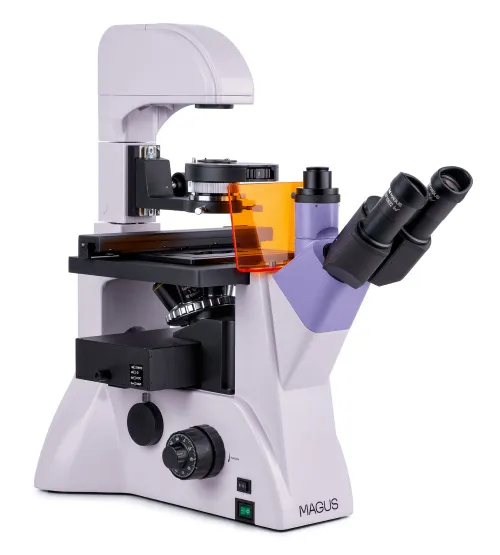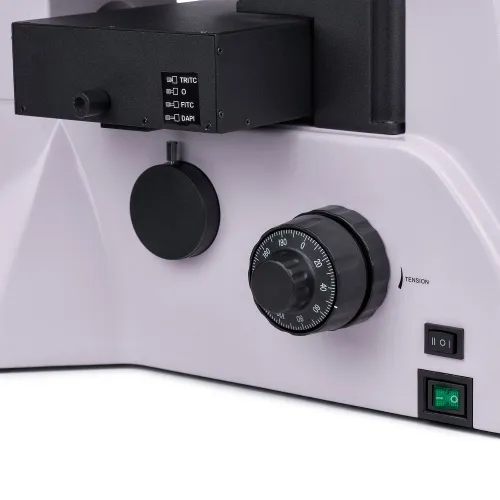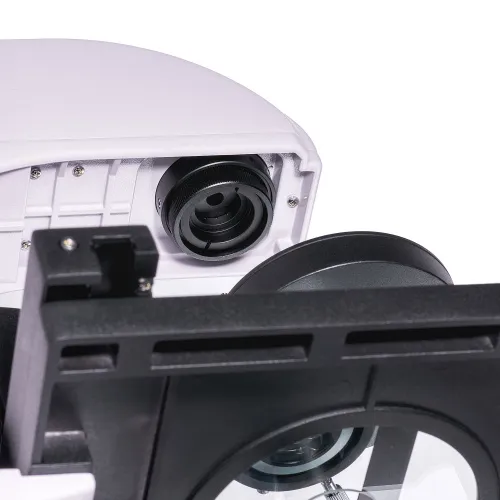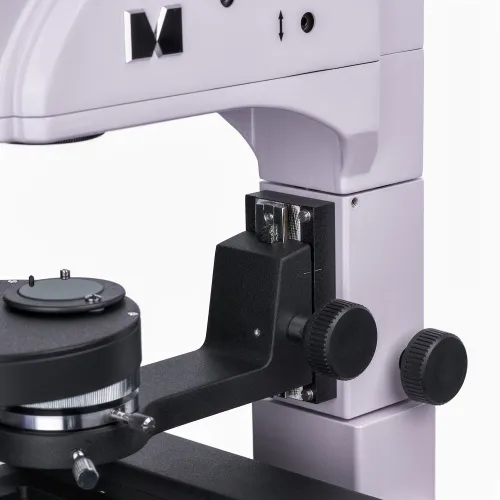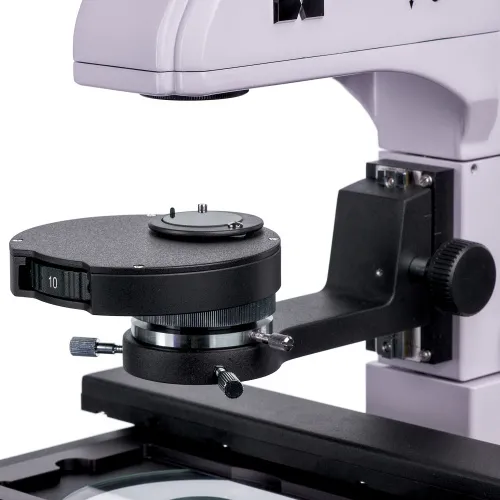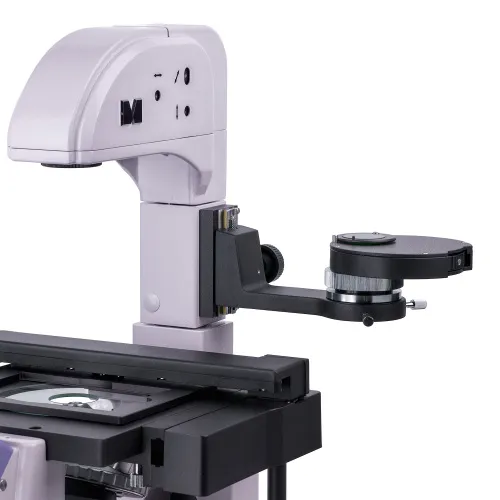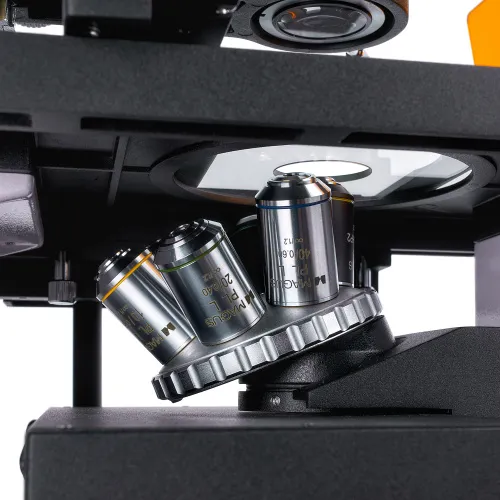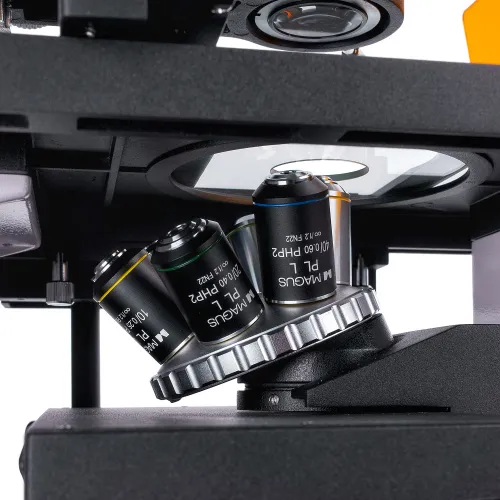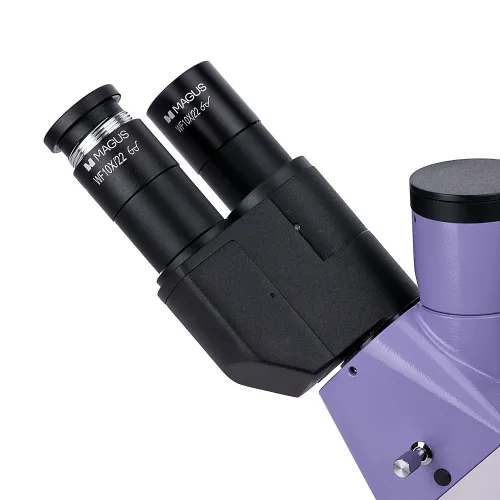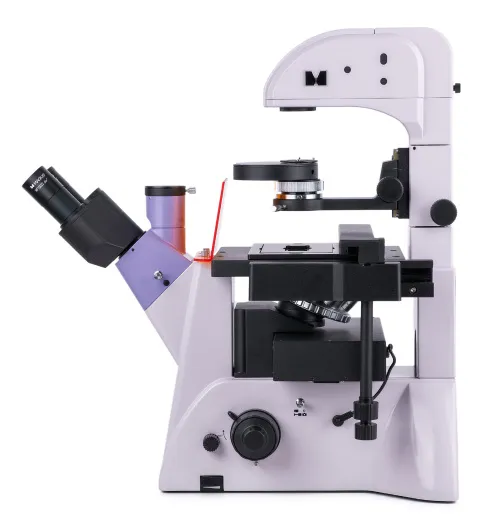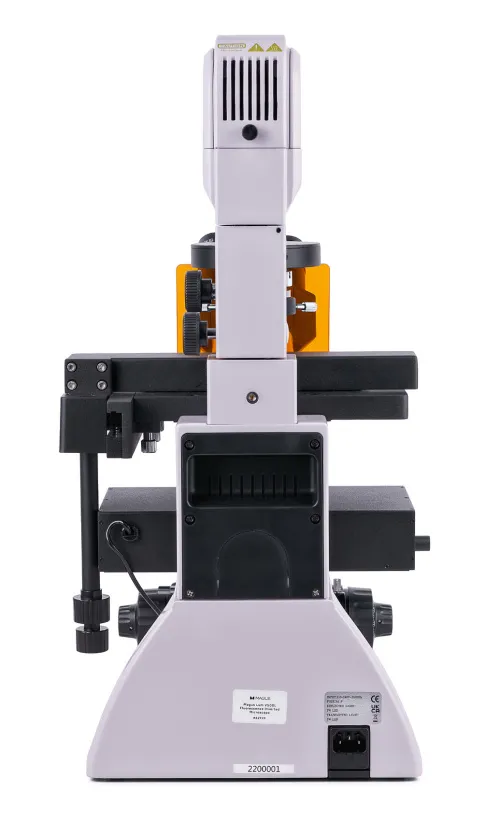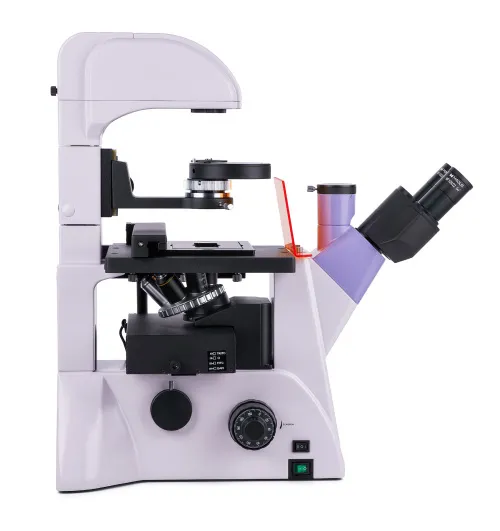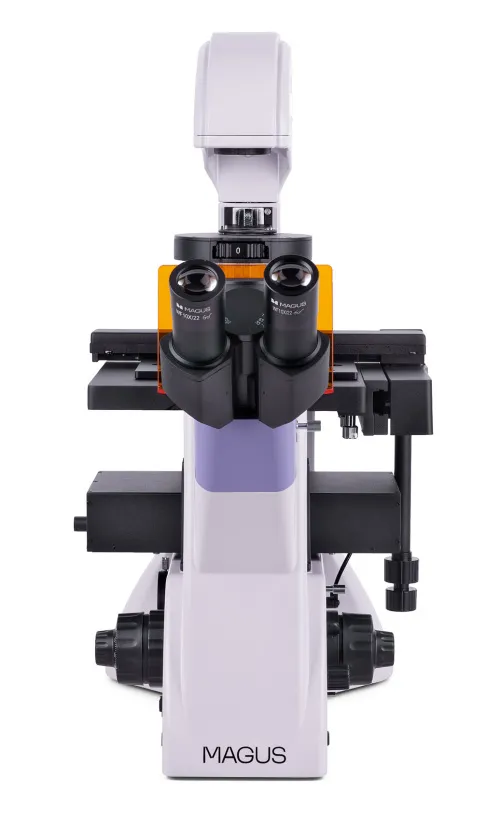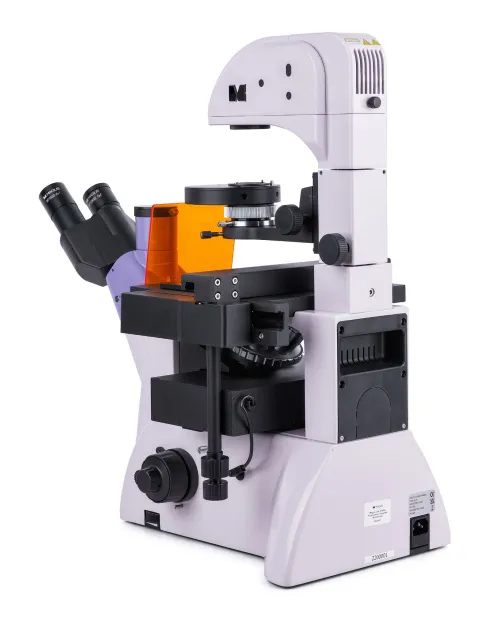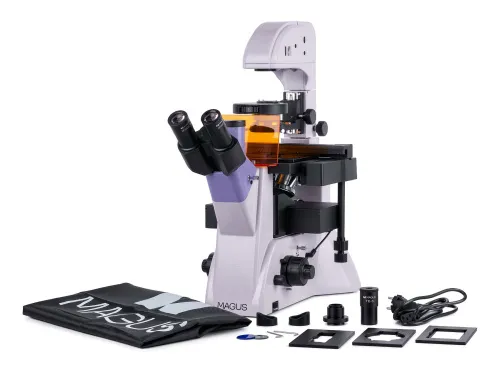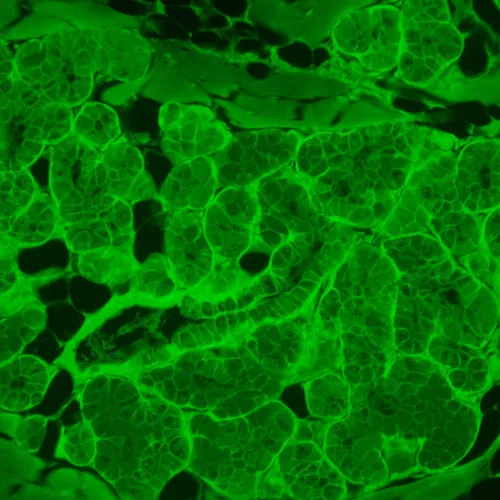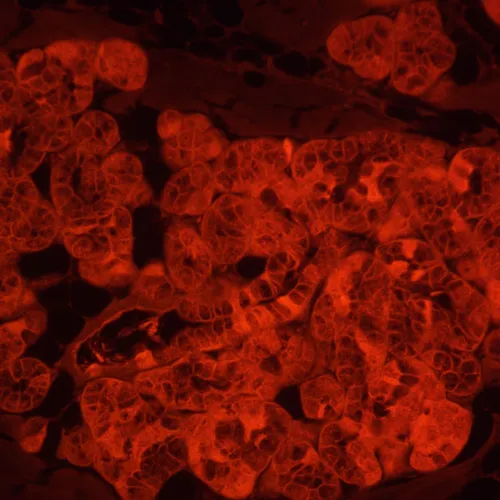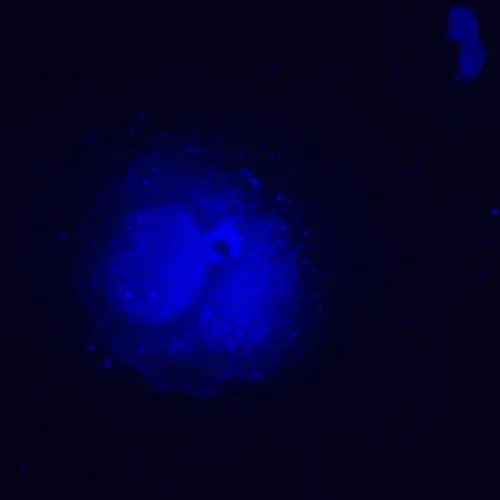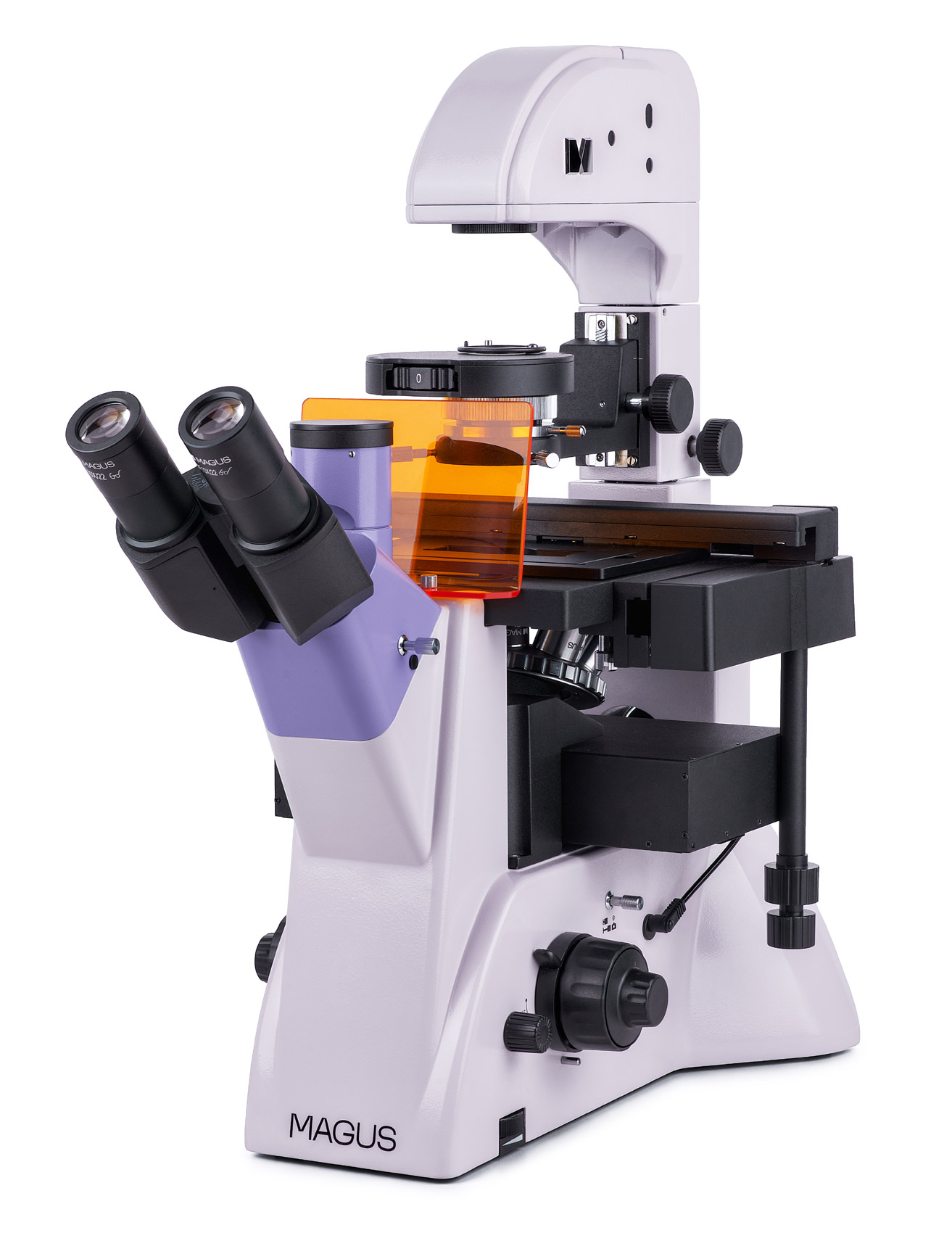MAGUS Lum V500L Fluorescence Inverted Microscope
Magnification: 100–400x. Trinocular head, plan achromatic objectives, 5W LED transmitted light and reflected light illumination, Köhler illumination
| Product ID | 82909 |
| Brand | MAGUS |
| Warranty | 5 years |
| EAN | 5905555018232 |
| Package size (LxWxH) | 38x61x82 cm |
| Shipping Weight | 24 kg |
The MAGUS Lum V500L is an inverted microscope for fluorescence microscopy in the reflected light and brightfield and phase contrast microscopy in the transmitted light. DAPI, FITC, and TRITC fluorochrome filters are used for fluorescence microscopy. The inverted design allows you to study samples in laboratory ware such as petri dishes, flasks, etc. The height of the lab ware can be 55mm or 165mm when the stand is tilted. The optics are designed for lab ware with a bottom thickness of 1.2mm. The microscope is ideal for research and routine laboratory work and it can be used for educational purposes.
Optics
Two options for mounting a digital camera and monitor: The trinocular tube is for mounting a monitor (not included), and the side port on the body is for mounting a digital camera (not included). There is beam splitting: 100:0/0:100 (on the body) and 100/0 or 50/50 (trinocular head). The 45° eyepiece tube inclination angle allows for observation with maximum comfort. When assembling the microscope, the user can rotate the eyepiece tubes 180°.
The set includes six plan achromatic objectives: three of them for brightfield and fluorescence microscopy, and another three for phase-contrast microscopy. They are infinity-corrected and have a long working distance. The revolving nosepiece has six slots for mounting objectives. The revolving nosepiece is located under the stage on a stand.
Illumination
The fluorescence excitation source is a 5W LED with 50,000 hours of lifetime without replacement. There are three excitation filters: DAPI, FITC, and TRITC fluorochrome filters. LED illumination is more energy efficient and easier to maintain than mercury illumination, which is why it is recommended for use in universities. LED illumination provides color consistency. The LEDs turn on and off quickly and do not overheat during long hours of operation.
The source of the transmitted light is also a 5W LED. It is bright enough for brightfield and phase contrast microscopy techniques with each objective.
Both reflected and transmitted illumination can be adjusted according to the Köhler method. It allows you to reach the maximum resolution limit for each objective lens and get a clear, sharp image without artifacts or darkening at the edges.
The microscope is equipped with a phase-contrast condenser: Three slots are used for phase objectives with magnifications of 10x, 20x, and 40x, and the fourth slot is for brightfield microscopy. Phase rings can be centered. You can switch between the microscopy techniques by rotating a dial.
Stage and focusing mechanism
The fixed stage is equipped with a mechanical attachment for moving laboratory ware and three cup holders of different sizes. The lab ware can be moved in two mutually perpendicular directions in the horizontal plane. The microscope has a coarse and fine focusing mechanism. The coarse focusing mechanism has a lock knob and tension adjustment. The knobs are ergonomically designed to allow the user to maintain a relaxed posture while working.
Accessories
The microscope can be equipped with additional eyepieces, calibration slides, or a digital camera from the MAGUS line of accessories.
Key features:
- Inverted design for observing samples in lab ware with a bottom thickness of 1.2mm and samples of up to 55mm height in as well as up to 165mm height if the stand is tilted up
- Microscopy techniques: fluorescence (reflected light), brightfield and phase-contrast (transmitted light)
- Köhler illumination setup for transmitted and reflected light; long-lasting 5W LEDs without replacement as light sources
- There are three excitation filters: DAPI, FITC, and TRITC fluorochrome filters
- Phase-contrast condenser for quick and convenient switching between the microscopy techniques
- Trinocular head; two options to mount a camera or monitor: the 100/0 or 0/100 beam splitting (on the body), 100/0 or 50/50 beam splitting (on the head)
The kit includes:
- Base with a power input, reflected light illuminator, transmitted light source, condenser, focusing mechanism, stage, and revolving nosepiece
- Trinocular head
- Infinity plan achromatic objective: PLL 10x/0.25 phase WD 4.3mm
- Infinity plan achromatic objective: PLL 20х/0.40 WD 8.0mm
- Infinity plan achromatic objective: PLL 40х/0.60 WD 3.5mm
- Infinity plan achromatic objective: PLL 10x/0.25 PHP2 WD 4.3mm
- Infinity plan achromatic objective: PLL 20x/0.40 PHP2 WD 8.0mm
- Infinity plan achromatic objective: PLL 40x/0.60 PHP2 WD 3.5mm
- Eyepiece 10x/22mm with long eye relief (2 pcs.)
- UV shield
- C-mount adapter 1x
- Hex key wrench
- Power cord
- Dust cover
- User manual and warranty card
Available on request:
- 10x/22mm eyepiece with a scale
- 12.5x/14mm eyepiece (2 pcs.)
- 15x/15mm eyepiece (2 pcs.)
- 20x/12mm eyepiece (2 pcs.)
- 25x/9mm eyepiece (2 pcs.)
- Digital camera
- Calibration slide
| Product ID | 82909 |
| Brand | MAGUS |
| Warranty | 5 years |
| EAN | 5905555018232 |
| Package size (LxWxH) | 38x61x82 cm |
| Shipping Weight | 24 kg |
| Type | biological, light/optical |
| Microscope head type | trinocular |
| Head | Siedentopf, rotatable 180° |
| Magnification, x | 100 — 400 |
| Magnification, x (optional) | 40–500/600/800/1000 |
| Eyepiece tube diameter, mm | 30 |
| Eyepieces | 10х/22mm, eye relief: 10mm (*optional: 10x/22mm with scale, 12.5x/14; 15x/15; 20x/12; 25x/9) |
| Objectives | infinity plan achromatic: PLL 10x/0.25/4.3; PLL 20x/0.40/8.0; PLL 40x/0.60/3.5; phase: PLL 10x/0,25/4,3 PHP2; PLL 20x/0.40/8.0 PHP2; PLL 40x/0.60/3.5 PHP2; parfocal distance: 45mm |
| Revolving nosepiece | for 6 objectives |
| Working distance, mm | 4.3 (10х); 8.0 (20x); 3.5 (40x) |
| Interpupillary distance, mm | 48 — 75 |
| Stage, mm | 227x208 |
| Stage moving range, mm | 77/134.5 |
| Stage features | fixed, with glass plate Ø118mm and mechanical attachment; dish holders: 86x129.5, Ø90mm; 34x77.5mm, Ø68.5mm; 57x82mm, Ø60mm; 29x77.5mm, Ø35mm |
| Condenser | NA 0.6, working distance: 55mm; phase contrast turret; with locking screws |
| Diaphragm | aperture iris diaphragm |
| Focus | coaxial coarse and fine focusing knobs located on both sides |
| Illumination | halogen, fluorescent |
| Brightness adjustment | ✓ |
| Power supply | 85–265V, 50/60Hz, AC network |
| Light source type | reflected light: 5W LED; transmitted light: 5W LED |
| Light filters | yes |
| Operating temperature range, °C | 5...+35 |
| User level | experienced users, professionals |
| Assembly and installation difficulty level | complicated |
| phase contrast condenser (turret) with a free slot and phase annuli plates for 10x, 20x and 40x objectives; centering auxiliary microscope | |
| Fluorescent module | Fluorochromes: DAPI, FITC, and TRITC |
| Fluorescence filter: filter type, excitation wavelength/dichroic mirror/emission wavelength | DAPI, 365/35nm/400nm/450/65nm; FITC, 475/40nm/500nm/535/45nm; TRITC, 525/45nm/565nm/595/60nm |
| Application | laboratory/medical |
| Illumination location | dual |
| Research method | bright field, fluorescence, phase-contrast microscopy |
| Pouch/case/bag in set | dust cover |
We have gathered answers to the most frequently asked questions to help you sort things out
Find out why studying eyes under a microscope is entertaining; how insects’ and arachnids’ eyes differ and what the best way is to observe such an interesting specimen
Read this review to learn how to observe human hair, what different hair looks like under a microscope and what magnification is required for observations
Learn what a numerical aperture is and how to choose a suitable objective lens for your microscope here
Learn what a spider looks like under microscope, when the best time is to take photos of it, how to study it properly at magnification and more interesting facts about observing insects and arachnids
This review for beginner explorers of the micro world introduces you to the optical, illuminating and mechanical parts of a microscope and their functions
Short article about Paramecium caudatum - a microorganism that is interesting to observe through any microscope

